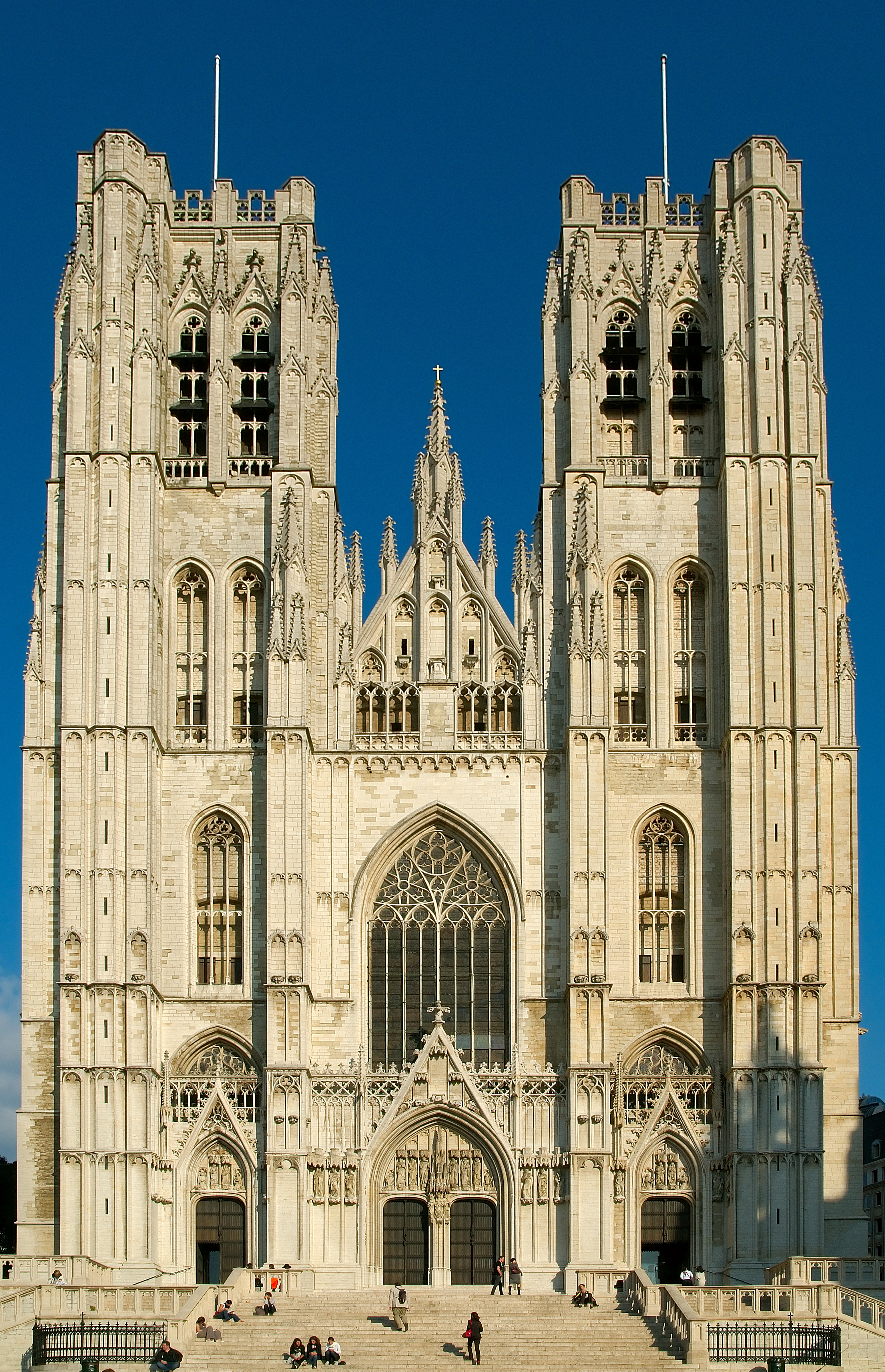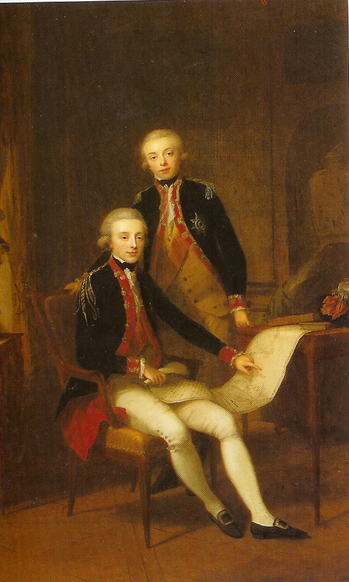|
Charles Terlinden
Charles Terlinden (1878—1972) was a Belgian historian, professor at the Catholic University of Louvain, and papal chamberlain.Henri Haag, "Terlinden, Charles", ''Nouvelle Biographie Nationale''vol. 3(Brussels, 1994), 323-325. Life Terlinden was born in Schaerbeek on 6 July 1878. He studied law at Saint-Louis University Faculty in Brussels, and at the Faculty of Law of the Catholic University of Louvain. After completing a doctorate in law, he began historical studies under Alfred Cauchie, with a thesis on Pope Clement IX and the War of Candia (1904). He followed this in 1906 with a second thesis on William I of the Netherlands and the Catholic Church in Belgium, making him a triple doctor. He was called up in 1914 and saw action at Melle. After the war he was a historical adviser to the Belgian delegation to the Paris Peace Conference, and in the aftermath was vocally critical of the way that Austria-Hungary had been dismembered. From 1918 until his death he was Professor of ... [...More Info...] [...Related Items...] OR: [Wikipedia] [Google] [Baidu] |
Association Royale Des Descendants Des Lignages De Bruxelles
The ''Association Royale des Descendants des Lignages de Bruxelles'' ( French) (Dutch'': Koninklijke Vereniging der Afstammelingen van de Brusselse Geslachten;'' ) is a hereditary organization of individuals who have documented their descent from at least one member of the Seven Noble Houses of Brussels. History Like the nobility, the Seven Noble Houses (or lineages) of Brussels were abolished during the French occupation. But whereas the nobility was officially recognised after the Belgian revolution of 1830, the lineages of Brussels were not. The ''Association'' was founded in 1961 as an asbl (non-profit) with the aim of bringing the descendants of the Seven Noble Houses together. Activities The descendants of the Seven Noble Houses are currently united within this organization which perpetuates their existence and their rituals dating back to the Middle Ages. For example, every year, the organisation takes an active part in the organization of the Ommegang. Publicati ... [...More Info...] [...Related Items...] OR: [Wikipedia] [Google] [Baidu] |
Catholic Church In Belgium
The Catholic Church in Belgium, part of the global Catholic Church in Belgium, is under the spiritual leadership of the Pope, the curia in Rome and the Episcopal Conference of Bishops. Dioceses There are eight dioceses, including one archdiocese, seat of the archiepiscopal residence and St. Rumbolds Cathedral, located in the old Flemish city of Mechelen (Malines in French). The Belgian church also oversees the Basilica of the Sacred Heart, the National Basilica of Belgium. In 2009, Cardinal André-Mutien Léonard was appointed new archbishop of Mecheln-Brussels and thus Belgium's new primate, but only after the 450th anniversary celebration of the Mechelen-Brussels archdiocese and the canonisation of Fr. Damien De Veuster of Molokai. Both events were led by Cardinal Godfried Danneels, his predecessor as Archbishop and Primate between 1979 and 2010. Before his appointment, Léonard was Bishop of Namur. Since 2015, the Archbishop of Mechelen-Brussels and primate of all Belgiu ... [...More Info...] [...Related Items...] OR: [Wikipedia] [Google] [Baidu] |
1972 Deaths
Year 197 ( CXCVII) was a common year starting on Saturday (link will display the full calendar) of the Julian calendar. At the time, it was known as the Year of the Consulship of Magius and Rufinus (or, less frequently, year 950 '' Ab urbe condita''). The denomination 197 for this year has been used since the early medieval period, when the Anno Domini calendar era became the prevalent method in Europe for naming years. Events By place Roman Empire * February 19 – Battle of Lugdunum: Emperor Septimius Severus defeats the self-proclaimed emperor Clodius Albinus at Lugdunum (modern Lyon). Albinus commits suicide; legionaries sack the town. * Septimius Severus returns to Rome and has about 30 of Albinus's supporters in the Senate executed. After his victory he declares himself the adopted son of the late Marcus Aurelius. * Septimius Severus forms new naval units, manning all the triremes in Italy with heavily armed troops for war in the East. His soldiers embark ... [...More Info...] [...Related Items...] OR: [Wikipedia] [Google] [Baidu] |
1878 Births
Events January–March * January 5 – Russo-Turkish War – Battle of Shipka Pass IV: Russian and Bulgarian forces defeat the Ottoman Empire. * January 9 – Umberto I becomes King of Italy. * January 17 – Battle of Philippopolis: Russian troops defeat the Turks. * January 23 – Benjamin Disraeli orders the British fleet to the Dardanelles. * January 24 – Russian revolutionary Vera Zasulich shoots at Fyodor Trepov, Governor of Saint Petersburg. * January 28 – ''The Yale News'' becomes the first daily college newspaper in the United States. * January 31 – Turkey agrees to an armistice at Adrianople. * February 2 – Greece declares war on the Ottoman Empire. * February 7 – Pope Pius IX dies, after a 31½ year reign (the longest definitely confirmed). * February 8 – The British fleet enters Turkish waters, and anchors off Istanbul; Russia threatens to occupy Istanbul, but does not carry out the threat. * Febru ... [...More Info...] [...Related Items...] OR: [Wikipedia] [Google] [Baidu] |
Bulletin De La Commission Royale D'Histoire
The Commission royale d'Histoire (in French) or Koninklijke Commissie voor Geschiedenis (in Dutch) is the Belgian Royal Historical Commission. It was founded by royal decree on 22 July 1834. They initially published their proceedings under the title ''Compte-rendu des séances de la commission royale d'histoire'' and since 1845 have published a journal, the ''Bulletin de la Commission royale d'Histoire / Handelingen van de Koninklijke Commissie voor Geschiedenis''. Members Victor Coremans Victor Amédée Jacques Marie Coremans (5 October 1802 – 23 October 1872) was a Belgian archivist, journalist, historian, and political activist. He supported the Flemish Movement, advocating nationhood for Flanders. Life and career Victor wa ... was appointed to the Commission in 1836. References History organisations based in Belgium Heritage organizations {{Belgium-stub ... [...More Info...] [...Related Items...] OR: [Wikipedia] [Google] [Baidu] |
Belgian Historical Institute In Rome
The Belgian Historical Institute in Rome ( nl, Belgisch Historisch Instituut te Rome, french: Institut historique belge de Rome, it, Istituto storico belga di Roma), founded 1902, is a scholarly research institute focused on the study of Roman, and more broadly Italian, history and antiquities. It is currently located in the Academia Belgica and is one of a number of Roman Historical Institutes. Foundation The idea for the foundation of a Belgian historical institute in Rome for the identification and publishing of Italian sources relating to Belgian history came from the ecclesiastical historian Alfred Cauchie, professor at the Catholic University of Leuven. He published a pamphlet to this effect in 1896. The institute was founded in 1902, in the Palazzo Rusticucci-Accoramboni, with Ursmer Berlière as its first director. Publications The institute has a strong focus on the publication of historical sources, primarily in the series ''Analecta Vaticano-Belgica''. The institute's ... [...More Info...] [...Related Items...] OR: [Wikipedia] [Google] [Baidu] |
Austria-Hungary
Austria-Hungary, often referred to as the Austro-Hungarian Empire,, the Dual Monarchy, or Austria, was a constitutional monarchy and great power in Central Europe between 1867 and 1918. It was formed with the Austro-Hungarian Compromise of 1867 in the aftermath of the Austro-Prussian War and was dissolved shortly after its defeat in the First World War. Austria-Hungary was ruled by the House of Habsburg and constituted the last phase in the constitutional evolution of the Habsburg monarchy. It was a multinational state and one of Europe's major powers at the time. Austria-Hungary was geographically the second-largest country in Europe after the Russian Empire, at and the third-most populous (after Russia and the German Empire). The Empire built up the fourth-largest machine building industry in the world, after the United States, Germany and the United Kingdom. Austria-Hungary also became the world's third-largest manufacturer and exporter of electric home appliances, ... [...More Info...] [...Related Items...] OR: [Wikipedia] [Google] [Baidu] |
Paris Peace Conference, 1919
Paris () is the Capital city, capital and List of communes in France with over 20,000 inhabitants, most populous city of France, with an estimated population of 2,165,423 residents in 2019 in an area of more than 105 km² (41 sq mi), making it the List of cities proper by population density, 30th most densely populated city in the world in 2020. Since the 17th century, Paris has been one of the world's major centres of finance, diplomacy, commerce, Fashion capital, fashion, gastronomy, and science. For its leading role in the arts and sciences, as well as its very early system of street lighting, in the 19th century it became known as "the City of Light". Like London, prior to the Second World War, it was also sometimes called Caput Mundi#Paris, the capital of the world. The City of Paris is the centre of the Île-de-France Regions of France, region, or Paris Region, with an estimated population of 12,262,544 in 2019, or about 19% of the population of France, making the ... [...More Info...] [...Related Items...] OR: [Wikipedia] [Google] [Baidu] |
Melle, Belgium
Melle () is a municipality located in the Belgian province of East Flanders. The municipality comprises the villages of and Melle proper. On 1 January 2018 Melle had a total population of 11,574. The total area is 15.21 km² which gives a population density of 761 inhabitants per km². Melle was mentioned in documents in 830, although the archeological findings prove the region was inhabited long before that date. The name Melle has two possible derivations: the Celtic word ''melina'' means "brown water"; the prehistoric name ''Melinos'' means "honey yellow". The village of Melle consists of three regions: Melle-Centre, Melle-Vogelhoek and Gontrode (since the fusion in 1976). One of its famous products is the Delirium Tremens beer, bottled by the Huyghe brewery. This beer is exported worldwide and was voted "Best beer in the world" in 1998 at the World Beer Championships in Chicago, Illinois, USA. Miss Belgium 2000, Joke van de Velde grew up and went to high school in Me ... [...More Info...] [...Related Items...] OR: [Wikipedia] [Google] [Baidu] |
William I Of The Netherlands
William I (Willem Frederik, Prince of Orange-Nassau; 24 August 1772 – 12 December 1843) was a Prince of Orange, the King of the Netherlands and Grand Duke of Luxembourg. He was the son of the last Stadtholder of the Dutch Republic, who went into exile to London in 1795 because of the Batavian Revolution. As compensation for the loss of all his father's possessions in the Low Countries, an agreement was concluded between France and Prussia in which William was appointed ruler of the newly created Principality of Nassau-Orange-Fulda in 1803; this was however short-lived and in 1806 he was deposed by Napoleon. With the death of his father in 1806, he became Prince of Orange and ruler of the Principality of Orange-Nassau, which he also lost the same year after the dissolution of the Holy Roman Empire and subsequent creation of the Confederation of the Rhine at the behest of Napoleon. In 1813, when Napoleon was defeated at the Battle of Leipzig, the Orange-Nassau territories ... [...More Info...] [...Related Items...] OR: [Wikipedia] [Google] [Baidu] |



